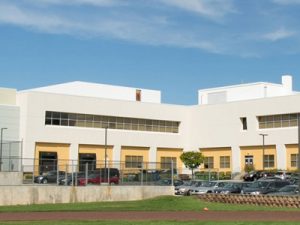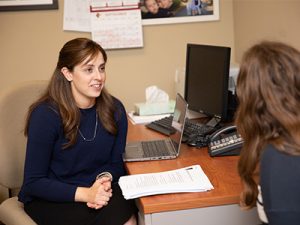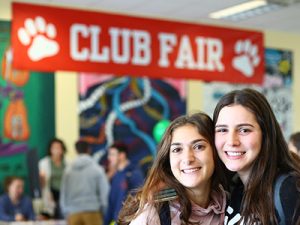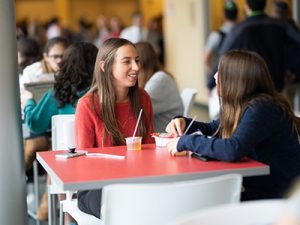English
In English courses at Frisch, students are exposed to the best of classical and contemporary literature which they analyze, discuss and write about throughout their high school years. The English curriculum is predicated upon a series of interconnected goals: students learn to write clearly and effectively conforming to conventions of standard written English, including appropriate mechanics and diction; through the study of fiction and non-fiction they learn to read and think critically and make intelligent inferences; students learn to understand and use critical sources when researching and to integrate secondary sources in well-conceived and constructed essays and papers.
In their study of literature students develop a more sophisticated ability to recognize and understand the function in a literary work including an awareness of tone, setting, language, literary and rhetorical devices, and point of view; and to comprehend how each contributes to the meaning of the work and why each was an intentional choice by the author.
The English department’s choice of required works is designed to foster an appreciation of literature as an art form and as an expression of human experience. Students are helped to respond to literature with sensitivity and understanding regarding characters, motivation, theme and language; to develop an active and creative relationship with the text; and to consider the possible universality of the work as well as its significance to the culture which produced it.
9th Grade
Writing instruction is a major emphasis. Writing assignments engage students in the different rhetorical types of the formal essay, ranging from the descriptive, to the narrative, the comparison, the argumentative, as well as the literary analysis essay. Students are steeped in the writing process as they learn to articulate and organize their ideas, as well as present their individual points of view. Literature is selected to be appropriate for the level of the specific class—the goals are to engage students with reading that stimulates their interest and that sparks their identification with the universal themes of self- discovery, as well as to enhance each individual’s ability to read and respond critically.
10th Grade
Students continue to refine their writing skills. Writing units present more complex models so students develop rich thesis statements and more sophisticated methods of coherent essay development. Students develop the capacity to read and react to the works of their peers, as well to other models of expository writing. They are challenged to expand their appreciation for different literary styles and points of view through exposure to literary works which span the modes of expression from prose to poetry and drama. In addition, students are encouraged to engage in more complicated literary texts and to appreciate literary creativity as an expression of culture, as well as of the historical moment.
11th Grade
The eleventh grade English class focuses on American Literature from the Romantic era through the Modern era. The focus of the course is on the development of an American voice and a unique identity which distinguishes American writing from literature from other countries. The major literary movements of Romanticism, Realism, Regionalism and various forms of Moderism are discussed, as students engage in a close reading of the literature in its cultural and historical context. For the writing component of the course, students write a variety of personal essays and literary analyses, devoting attention to the use of evidence, topic development, pacing, editing, proofreading and revising skills. Each student is encouraged to develop his/her own voice, as well as a mature sensitivity to language and the infinite possibilities of individual expression. Students refine their abilities to research and utilize secondary resources in their writing. Juniors continue to develop critical reading skills and grow in their appreciation of individual creativity and the power of literature to depict the human condition through diverse lenses of artistic reflection. They improve their ability to identify and analyze complex structures of literary activity, as well as to connect to the themes resonating within each work.
Junior Electives Creative Writing
Students are exposed to various forms of written expression, including poetry, short fiction, creative non- fiction, and screenwriting. Students both read works and write their own pieces that adhere to these various forms. The course is designed as a workshop; students share their work with their peers and also give and receive feedback in smaller groups. Students cultivate their own personal writing styles and become attuned to their particular creative processes.
Introduction to Communication
The Communication elective for juniors covers the development and application of various modes of communicating. Beginning with the origins of written and spoken language, the class covers the philosophy, ethics, and legal dimensions of communication in all its varied forms. Students learn about the communication industry and study mass media in its theoretical and actual forms.
Journalism/Media Studies
The course is designed to sensitize students to the various presentations of news topics in various outlets, to recognize agendas and bias, and to give students an opportunity to practice basic journalistic skills like brainstorming articles, researching, collecting data, structuring interviews, and writing hard news articles for publication on Frisch Off The Press’ online publication. Students study the structure of written pieces presented in newspapers, magazines and websites, and compare presentations to the audio and visual ENG resources.
Using an Israel-advocacy lens, students explore how facts and quotes can be presented to argue one viewpoint or another, albeit implicitly. In their own writing, students are held to a journalistic standard of objectivity, working daily to cover the myriad events and stories which are part of the Frisch experience and which are of interest to a Frisch readership, in school and beyond.
Rhetoric & Composition
Students analyze works of nonfiction and the elements of argumentation. Rhetorical devices and techniques are examined and authorial intent in persuading audience is a consistent focus. Writing in a variety of formats to mirror the plethora of approaches studied helps students assume the mantle of content creator and put theory into practice. Students in this course are prepared for the Advanced Placement exam in English Language and Composition.
Rhetoric & Public Speaking
Students gain a thorough introduction to public speaking and learn the key elements of effective communication.
Over the course of the semester, each student presents four speeches: autobiographical, informative, persuasive, and a final presentation showcasing content and delivery.
12th Grade
Seniors are given the opportunity to follow their own passion and choose a literature or writing course. These courses continue to build on the student’s reading and writing skills. Using the themes as a guide, students analyze literature, participate in meaningful discussions, and write in multiple modes.
Utopian and Dystopian Literature (Honors)
Students explore the 20th century’s descent from the meliorism inspired by the Enlightenment into the dystopian pessimism provoked by the First World War. The reading for the class includes novels from the following list:
- Brave New World (summer reading)
- Survival in Auschwitz/ A Handmaid’s Tale/ Anthem
- A High Wind in Jamaica
- The Trial
- Lord of the Flies
- 1984
- Animal Farm
- Badenheim 1939
- Butcher’s Crossing
- The Plot Against America
- Gulliver’s Travels
- “Politics and the English Language” “A Modest Proposal”
The Matrix of Self: Searching for Meaning (Honors)
The Western literary tradition documents the individual’s search for love and meaning through the shifting contexts of personal and social experience. Whether this search is posed in spiritual terms as redemption or in psychological terms as fulfillment, human relationships—determined by community, gender and even, internally, within the “matrix” of self—struggle to grasp moments of exhilaration and connection, or, at times, reconciliation and resignation. Students examine the individual’s search for meaning in the network of their relationships with the “Other” as they reflect the many aspects of the self, the individual’s internal, personal identity.
- Othello
- Waiting for Godot
- The Sorrows of Young Werther
- Crime and Punishment
- Sons and Lovers
- Death in Venice
- Nausea
- The Beast in the Jungle
- Portrait of the Artist As a Young Man
- The Mind Body Problem
- Selected poetry from Donne, Milton, Wordsworth, Coleridge, Browning, Yeats, Whitman, Pound and Eliot.
Fantasy and Science Fiction (Honors)
George R. R. Martin writes “we read fantasy to find the colors again—to taste strong spices and hear the songs the Sirens sang. There is something old and true in fantasy that speaks to something deep within us, to the child who dreamed that one day he would hunt the forests of the night and feast beneath the hollow hills and find a love to last forever somewhere south of Oz and north of Shangri-La.” Meanwhile, we live in a science fictional age. Space exploration, nanotechnology, bioengineering, robotics, environmental engineering, and many other technological breakthroughs are changing how we see ourselves, how we interact with our environment, even how we define ourselves as a species. Science fiction explores technological, social, and environmental change in human terms, investigating what it might mean— the hidden dangers and wondrous potential for human societies. Lovers of both these genres call them by their umbrella term: Speculative Fiction. Fantasy and Science Fiction is a short story course sampling the history of Speculative Fiction and examining the major sub-genres and authors, including those who blend the two.
Writing
The Writing course focuses on envisioning and creating expository selections. Students work through the process of pre-writing, drafting, revising, and editing in order to create pieces which explore the various styles and modes of non-fiction writing, from definition/classification, to narrative, through research methods. Analyses of examples of writing with a focus on rhetorical strategies help sensitize students to the different presentations of argument.
Sports in Literature
Sports has played an important role in American fiction. It has served as the setting for novels such as The Natural, and The Universal Baseball Association or as the source of strength for the hero of a novel as Joe DiMaggio does in The Old Man and the Sea. The class focuses on the use of sports as a metaphor and as a mythic setting by authors to portray universal themes.
The readings will come from the following list:
- The Great American Novel
- The Sun also Rises
- The Old Man and the Sea
- The Universal Baseball Association
- The Reivers
- Snow in August (summer reading)
- The Chosen
- Shoeless Joe
- Breaking Away
- Requiem for a Heavyweight
- “The Battler”
The Hyphenated American Experience
Students study literature written by African-American, Hispanic- American, Asian-American, Jewish-American, Indian-American and Muslim-American authors to gain perspective on the American experience. The distinct literary styles and cultural influences of “hyphenated Americans” is emphasized. Students draw comparisons between the different “lived worlds” of these groups and contrast their experiences with the myth of the American dream. Students discern whether or not there is an American experience distinct from the hyphenated American experience. Readings include works from authors such as: Jumpha Lahiri, Junot Diaz, Chimamanda Nygozi Adichie, Nathan Englander, Julia Alvarez, Colson Whitehead, Alice Walker, Fae Myenne Ng, Philip Roth, G. Willow Wilson and Khaled Hosseini.
Banned Books
Books that have been banned or perceived as questionable by various societies at some point in history are analyzed. Race, gender, politics and economics are discussed, as students grapple with questions including, Are books meant to spark conversations? How important is freedom of speech? Is censorship ever justified?
Literature and Social Justice (Honors)
Literature and Social Justice focuses on understanding issues that impact society both demographically and culturally. Students read works of fiction and non- fiction that champion the marginalized in society and celebrate their triumphs. Topics to be discussed include stereotypes, discrimination, and prejudice. Students examine these issues in literature, respond critically and make informed decisions about their own world.
War, What is it Good For?
Students read texts, both fiction and nonfiction, that illustrate the experience of war from multiple perspectives. Readings include novels and memoirs written from the perspective of soldiers and civilians during wartime and post wartime. Readings include The Things They Carried, Jarhead, The Yellow Birds, Hiroshima, All Quiet on the Western Front, All the Light We Cannot See, The Lemon Tree.
Women in Literature
Women in Literature focuses on how women have been represented in fiction by both male and female authors. Readings are selected from authors of different historical periods, geographical areas, and literary perspectives and include novels, short stories, essays, poetry and plays. What is women’s literature? What trials do female characters face that differ from those faced by male characters? The course examines how society’s ideas about gender shape human existence.
Medical Narratives
Students read both fiction and non-fiction centered on medical topics. The course is divided into four sections: Doctors’ perspectives on treatment, patients’ perspectives on illness and death, doctors as patients, and family members’ stories. Students explore the language used in these narratives and consider how people express themselves and think about their lives in the midst of crisis. Students also examine the therapeutic power of writing and the importance of giving voice to struggle, as well as ethical issues surrounding medical treatment. In addition to composing formal analyses of the texts read, students have the opportunity to express their own thoughts in creative form.





